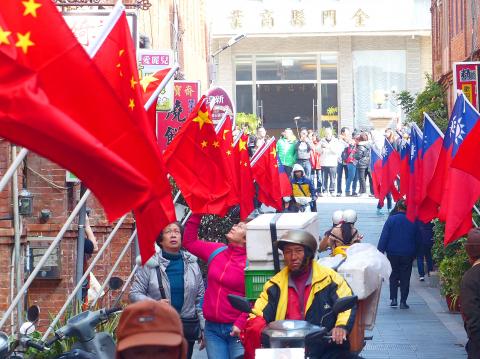Kinmen’s Mofan Street (模範街) has become a new sightseeing spot for tourists from across the Strait after it was decorated with a sea of flags of both the Republic of China (ROC) and the People’s Republic of China (PRC).
Local residents might fly the national flag during Double Ten National Day, but during the New Year holiday the street, which was built in 1924, was lined with national flags on one side and Chinese flags on the other. Many visitors were seen taking pictures and sharing them on social media.
Two Chinese visitors from Xiamen in China’s Fujian Province said it felt good to see their country’s familiar five-star flags.

Photo: Wu Cheng-ting, Taipei Times
The two flags facing one another on the street “symbolize that the two sides of the Strait can coexist and prosper together,” a Taiwanese surnamed Lee (李) said.
Some tourists have compared the street with Panmunjom — the joint security village located between South Korea and North Korea where the 1953 Korean Armistice Agreement that ended fighting in the Korean War was signed.
While many residents said they did not know who first put up the Chinese flags, Dongmen Borough (東門里) Warden Tsai Hsiang-kun (蔡祥坤) said the idea was broached by local ceramic artist Wang Ming-tsung (王明宗).
The motive was quite simple at the onset, Tsai said: to boost local economic activity.
Hanging two flags side by side is a form of installation art and a creative idea, Wang said, adding that more Chinese than Taiwanese visit Kinmen nowadays.
The question of whether the flags are symbolic of “one nation on each side [of the Taiwan Strait]” or “one country, two systems” (一國兩制) is on many visitors’ minds, Wang said.
Wang and Tsai said they were delighted to see the street invigorated by tourists and the flags would remain there until the Lunar New Year in February.
However, they called on visitors not to drive cars into the street.

Alain Robert, known as the "French Spider-Man," praised Alex Honnold as exceptionally well-prepared after the US climber completed a free solo ascent of Taipei 101 yesterday. Robert said Honnold's ascent of the 508m-tall skyscraper in just more than one-and-a-half hours without using safety ropes or equipment was a remarkable achievement. "This is my life," he said in an interview conducted in French, adding that he liked the feeling of being "on the edge of danger." The 63-year-old Frenchman climbed Taipei 101 using ropes in December 2004, taking about four hours to reach the top. On a one-to-10 scale of difficulty, Robert said Taipei 101

Nipah virus infection is to be officially listed as a category 5 notifiable infectious disease in Taiwan in March, while clinical treatment guidelines are being formulated, the Centers for Disease Control (CDC) said yesterday. With Nipah infections being reported in other countries and considering its relatively high fatality rate, the centers on Jan. 16 announced that it would be listed as a notifiable infectious disease to bolster the nation’s systematic early warning system and increase public awareness, the CDC said. Bangladesh reported four fatal cases last year in separate districts, with three linked to raw date palm sap consumption, CDC Epidemic Intelligence

Two Taiwanese prosecutors were questioned by Chinese security personnel at their hotel during a trip to China’s Henan Province this month, the Mainland Affairs Council (MAC) said yesterday. The officers had personal information on the prosecutors, including “when they were assigned to their posts, their work locations and job titles,” MAC Deputy Minister and spokesman Liang Wen-chieh (梁文傑) said. On top of asking about their agencies and positions, the officers also questioned the prosecutors about the Cross-Strait Joint Crime-Fighting and Judicial Mutual Assistance Agreement, a pact that serves as the framework for Taiwan-China cooperation on combating crime and providing judicial assistance, Liang

US climber Alex Honnold left Taiwan this morning a day after completing a free-solo ascent of Taipei 101, a feat that drew cheers from onlookers and gained widespread international attention. Honnold yesterday scaled the 101-story skyscraper without a rope or safety harness. The climb — the highest urban free-solo ascent ever attempted — took just more than 90 minutes and was streamed live on Netflix. It was covered by major international news outlets including CNN, the New York Times, the Guardian and the Wall Street Journal. As Honnold prepared to leave Taiwan today, he attracted a crowd when he and his wife, Sanni,